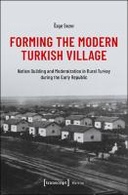Explore

During the early republican period, architectural interventions in rural Turkey took the form of social engineering as part of the state's modernization and nationalization policies. Özge Sezer demonstrates how the state's particular programs had a powerful effect on rural life in the countryside. She examines the regime's goals and strategies for controlling the rural people through development projects and demographic shaping to create a strong Turkish identity and a loyal citizenry. The book outlines the implementation of new rural settlements, particularly following the 1934 Settlement Law, with a geographic focus on two cities - Izmir and Elazig - with varied socio-economic and ethnic standing in the state program.
This book is included in DOAB.
Why read this book? Have your say.
You must be logged in to comment.
Rights Information
Are you the author or publisher of this work? If so, you can claim it as yours by registering as an Unglue.it rights holder.Downloads
This work has been downloaded 42 times via unglue.it ebook links.
- 42 - pdf (CC BY) at Unglue.it.
Keywords
- Architecture
- Cultural history
- Culture
- European History
- History
- History of the 20th Century
- Memory Culture
- Rural Modernism
- Social history
- thema EDItEUR::N History and Archaeology::NH History::NHD European history
- thema EDItEUR::N History and Archaeology::NH History::NHT History: specific events and topics::NHTB Social and cultural history
- turkey
Links
DOI: 10.14361/9783839461556Editions

